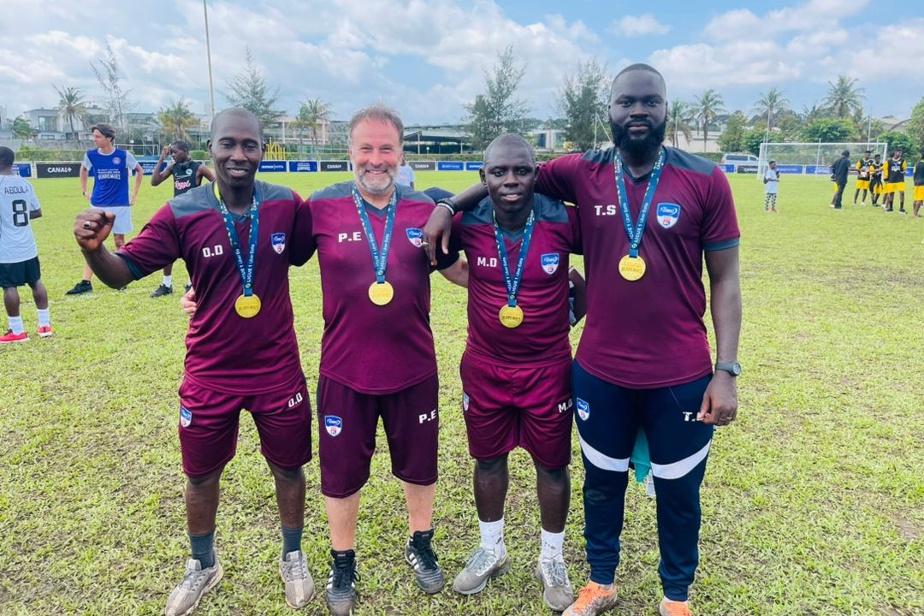“What had to happen happened,” says Philippe Eullaffroy, on the other side of the screen. We got stuck in the sand. In the middle of the savannah. We could see the complex, which was 500 meters away as the crow flies. And we were like two idiots, stuck in the car. »
Eullaffroy is the former director of the Montreal Impact Academy. He is today in Senegal, where he is technical manager of the Dakar Sacré-Cœur.
The anecdote he tells to La Presse, as part of this 45-minute videoconference interview, occurred at the beginning of the month. It’s 4 p.m. in Montreal, 9 p.m. in Dakar. In his downtown studio, Eullaffroy’s eyes are tired after another long day of football, but he’s smiling from ear to ear as he launches into his story.
“I was with a recruiter from Chicago. We were going to visit the facilities of a very beautiful academy, Génération Foot. She belongs to FC Metz, France. »
The complex is 70, 80 kilometers southeast of Dakar, he says. With the “hellish traffic” in the Senegalese capital, “it takes you about 2 hours 30 minutes” to get there.
The director of the academy had warned him: “You will see, in the end, the road turns into a track, don’t be surprised. »
“We follow the GPS, stupid and disciplined,” laughs Eullaffroy.
As expected, they arrive at said “trail”. The road narrows, then narrows. There is ultimately only room for “half a car”.
The vehicle gets stuck. No way to reach the director by phone. The two men go their separate ways to try to find help. Eullaffroy came across a small group of Senegalese “who were doing a little market gardening.” “They have salad, stuff like that. »
“Sit down, let’s eat!” », they tell him.
“OK, great,” our man replies. But not for long because I have a problem with my car. »
After having “nibbled a little”, the “six or seven” Senegalese agreed without hesitation to give him a helping hand.
In the meantime, the Chicago man had also found help. With their “ten Senegalese farmers”, we solved the problem fairly quickly. But then, “we shouldn’t go back into the sand either.”
“So that was fabulous. There were 10 Senegalese friends who told us 10 different things. Move forward while the other says back. Go left while the other says go right. I crash into a tree, I crash into something else. It was folkloric! »
The moral of this story ?
They were “very kind”, he says, weighing his words. “It’s amazing stuff. »
Senegal is the most powerful soccer nation in Africa at the moment. The Lions are African champions among seniors, under-20s and under-17s. The country “has a very, very good reputation, and it’s justified,” says Eullaffroy.
Our interlocutor has been there since August. He left his position as director of high performance at Soccer Québec at that time, having worked within the federation for a year.
He was fired in 2020, at the start of the pandemic, when the club was in financial difficulty. We will return to this in the second text of this file.
Today, at Dakar Sacré-Cœur (DSC), Philippe Eullaffroy is responsible for “establishing a playing identity which was very little affirmed by the club” until then. It’s about “highlighting their progress, their work, and the way they behave on the pitch.”
This is because the DSC has two pillars in its business plan. The first concerns “leisure soccer”, i.e. pitch rental and events. The second is the “selling” of players. And “to sell players, you have to expose them,” emphasizes Eullaffroy.
The DSC is “very young.” “Nearly 60% of the workforce is under 21 years old. »
Yes, this strategy is similar to that of CF Montreal. But at Bleu-blanc-noir, we still claim to aspire to great honors.
At Sacré-Cœur, which has a partnership with Olympique Lyonnais, “the only big pressure is maintaining” in the first division. Otherwise, sportingly, the goal is “to perform well, to play good soccer, and to have players who express themselves well.”
“As Martin Matte would say, we are condemned to excellence! », says the adopted Quebecer.
Moreover, the club is very recognized internationally, he says, having received visits from clubs from all over the world – from Chicago, Nashville, Vienna, Ajaccio.
“It won’t stop scrolling. »
The crazy nature of the anecdote told at the beginning left no room for doubt: “My life, currently, is an adventure,” believes Eullaffroy.
“I arrive in a country that I don’t know at all, with a culture that I don’t know at all. It requires a lot of concentration at the start to adapt to this new environment, and enrich yourself at the same time. »
He says he is surrounded by “extraordinary people, who represent the Senegalese of the teranga well”. Teranga is the notion of respect, hospitality and welcome that makes Senegal famous. “I confirm that [it’s deserved],” says Eullaffroy.
His only regret is that he is there without his wife and son, who remained in Montreal for work and school.
“When I come home, I’m all alone. So I get back to work pretty quickly. Overall, it’s six to seven days of soccer per week. »
The distance that separates him from his loved ones is also the essence of “the big question” he is asking himself now. He has a one-year contract with the DSC, an agreement that provides for two option years. Although he finds his project “exciting,” he will have a discussion about it with the owner in the spring.
For the moment, Philippe Eullaffroy is enjoying his new Senegalese life, even if he cannot share it with his family. With the “freedom” he has professionally, he discovers the city through his activities with the club.
And at the wheel of his “little car”, which “survived” his adventure in the sandbank.
“I think she survived that easier than the traffic in downtown Dakar! »
